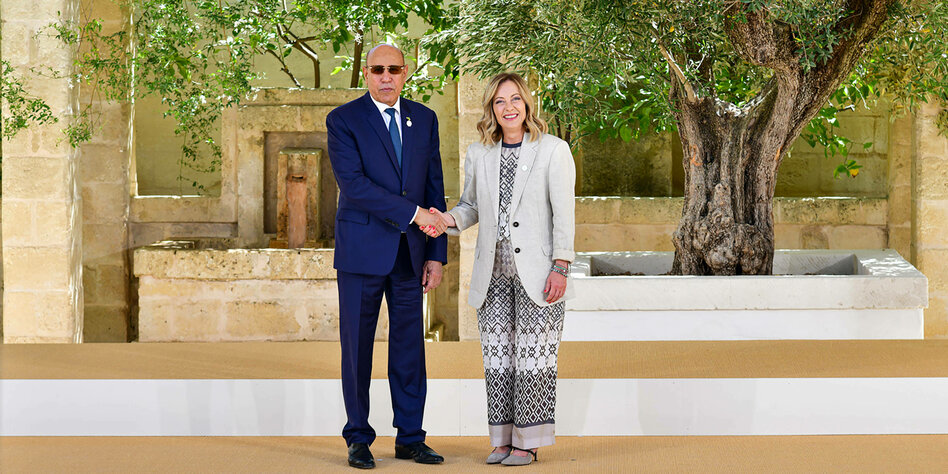Mauritania is holding its second democratic presidential election. The incumbent Ghazouani has little to offer, especially to young people.

Ghazouani courts Meloni at the G7 summit in Bari in mid-June Photo by: imago
SEDAN cup | Since February, Mauritanian President Mohamed Ould Ghazouani has also been the president of the African Union. There is a lot of circulation there, which is not the worst thing for the election campaign. Ghazouani is considered the most promising candidate for Sunday's elections in the West African Sahel state.
Ghazouani began his election campaign in mid-June in a sports stadium in the capital, Nouakschott, broadcast through Tiktok. During his first term, among other things, he launched a multibillion-dollar project for the production of green hydrogen. This is a Hamburg company; The hydrogen produced is intended, among other things, to largely cover future needs in Germany.
The election of the pro-Western former general, who comes from a Sufi family, in 2019 was the first democratic transfer of power since the country's independence, after a 30-year series of military coups. Unlike its neighbors, the Islamic Republic of Mauritania has so far been spared jihadist attacks and can be considered comparatively stable.
Human rights activists, however, criticize the fact that the country does not officially practice the death penalty but has also not abolished it, homosexuality remains prohibited, and very little is done to combat widespread slavery and illiteracy.
Many young people prefer to flee
Ghazouani's motto is “Secure Elections,” but it fails to spread a spirit of optimism. Many young people see no future for themselves: in 2023, around 15,200 Mauritanians were among the refugees who crossed Central America to the southern border of the United States, the largest African group. A total of 150,000 people, mostly young people, are said to have left the country since the pandemic, with a population of only 4.7 million. People under 35 years old make up 70 percent of the population.
Six candidates are running against Ghazouani, including his predecessor Mohamed Ould Abdel Aziz, whose candidacy was not approved at the end of 2023 after being convicted of money laundering and corruption. Aziz denies the allegations and claims he was politically marginalized.
Among those authorized to compete is the “slave hunter” Biram Ould Dah Ould Abeid, who came in second place in 2019, has been especially committed to human rights for years and, as a result, has been in prison several times. Hamadi Ould Sid' El Moctar of the Muslim Brotherhood, whose Islamist Tewassoul party was not legalized until 2007, has no chance. The lawyer and black Moor Me El Id Mouhameden M'Bareck founded the opposition alliance “Coalition of Hope” and called during the election campaign for greater redistribution and a stronger fight against corruption. M'Bareck wants to establish a “government of national unity.”
First-time economist Hamidine Moctar Kane tries to score points with the fact that he comes from a family of members of both black and Arab ethnic groups and can therefore credibly advocate for greater balance between ethnic groups.
